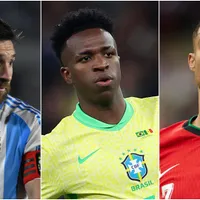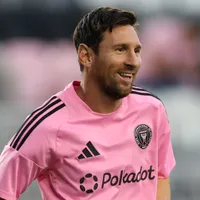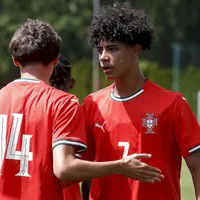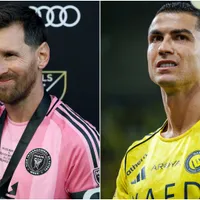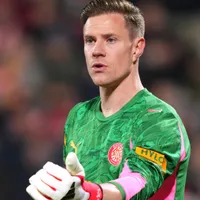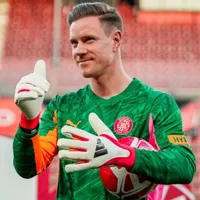This was arguably the game of the World Cup so far. With a respectful nod to Argentina–Mexico, the reason we love soccer is contests like this.
The World Cup is not the World Cup without the best facing the best. And Spain’s draw with Germany was its nearest tie yet to a heavyweight classic. Both captains were former winners. Also, there was Champions League experience aplenty. Finally, three of world soccer’s best midfield entertainers for the next decade played. Gavi and Pedri represented Spain against Germany’s Jamal Musiala.
Additionally, and more fundamentally, it was high stakes. Even after a favor from Costa Rica, Germany faced potential elimination. The emotional release when Germany drew level told a similar story to Lionel Messi’s face when he broke the deadlock against Mexico: we are who we think we are; we are still contenders.
Spain–Germany had world-class close control, first-touch passing, and decisive tactical variation from both coaches. But, best of all, it had those favorite Jürgen Klopp ingredients. Tangible passion and mentality.
And this time Germany put on the show. To put it crudely – as ex-Bayern man Sandro Wagner did when co-commentating live on German television – while Spain had more of the ball, Germany had cojones.
The game of the World Cup
The rags-to-riches bonus narrative of Niclas Füllkrug’s equaliser told more than his own story. The 29-year-old’s career has yo-yoed between Germany’s top two tiers and he is still to play 90 competitive international minutes. But the Bremen man’s leveller hinted at several threads of tournament game-play.
After all of Spain’s proto-Tiki-Taka 2.0, they subbed on Morata, spread the ball wide, and the “traditional” No. 9 beat Niklas Süle to the near post and finished Jordi Alba’s cross smartly.
At that point around the hour mark, Germany looked shaky. Just minutes earlier, Luis Enrique had blinked first in making the opening substitution and tactical change (Morata for Torres). Leon Goretzka and Joshua Kimmich earned yellow cards a few moments apart, and then Enrique was justified with Morata’s goal.
Germany had somewhat gone for broke from the beginning. Putting “the system” to one side for the sake of nullifying Spain’s Barcelona trio in midfield, Goretzka had played instead of Kai Havertz and Germany pressed high against probably the best ball-playing side in the tournament. In the first ten minutes, it seemed they could be ripped apart. And what would Flick do if they went behind?
Big risks pay off
Neither side began with a central striker. With Rodri at centre-back and Asensio as the all-action “false 9,” Spain had players all over the pitch who could give and receive the ball under pressure. They banked on the German defenders’ inability to do the same, chased them fervently, and were nearly rewarded several times in the first half.
It was a wonderfully open game at 0–0. But there are different ways to win at football. Sometimes the ideal system and the better players aren’t the key differentials. Sometimes ‘wanting it more’ goes a long way. Germany had all the grit they needed against Spain.
The game was less refined in the second half. Both sides simplified their approach: the ball often went wide and either wingers ran behind the line or crosses were tossed in the air. Germany were fantastically physical throughout, they forced errors, and then came Füllkrug.
past meets future
Rewind twelve years and Sergio Busquets and Manuel Neuer faced off in a World Cup semi-final. Busquets was just 21 but already a Champions League winner. Neuer was still a Schalke player at 24. They were the faces of world soccer’s ascendent powers.
In footballing terms, Busquets and Neuer have both seen the rise and fall of dynasties. Pep Guardiola’s reconstruction of the game – from Barca’s La Masia graduates to the Bayern Munich of his converted fullback Philip Lahm – influenced both the 2010 and 2014 World Cup winning Spanish and German sides.
It was often said – even besides Guardiola – that Germany’s rise borrowed from the Spanish “model.” Between them they won everything internationally between 2008 and 2014. But top players get old and retire. And the rest of the world watched and learned too. After Spain crashed and burned in 2014 and 2018, Germany did likewise at Russia 2018 and the delayed Euro 2020. The “cycle” had to begin again.
Germany and Spain both mixed youth and experience this year and Spain have been more radical.
As Luis Enrique trusted in Barcelona teenagers Pedri and Gavi, Thiago Alcantara, the Premier League’s best playmaker, did not even make the squad. Pedri only turned 20 two days after Spain hammered Costa Rica in their World Cup opener, yet he has already played a major tournament semi-final. Such is the faith in the talent, and the process, of the national setup.
Germany, in contrast, have ummed and erred. Joachim Löw tried to be radical, notoriously excluding Mats Hummels, Thomas Müller, and Jérôme Boateng before the football public was ready to accept it, and results undermined him. The simmering worry has been that the talent just is not there. This year’s squad told a mixed story: a recall for Mario Götze, hardly the future of German football; and warm receptions for Youssafa Moukoko and Jamal Musiala, who hopefully are.
The sad truth was that Germany celebrated today’s point like a win. They aren’t where they should be and could still return home to ridicule. We could still see a fairytale as well, but in the long run, Germany need to keep learning from Spain.
Drama is a winner
The best face of this World Cup has been its on-pitch drama. The game off the pitch has been disillusioning. But the actual football – the upsets, the tension, the Niclas Füllkrug of it all – is a beautiful sight.
PHOTO: IMAGO / Sven Simon

